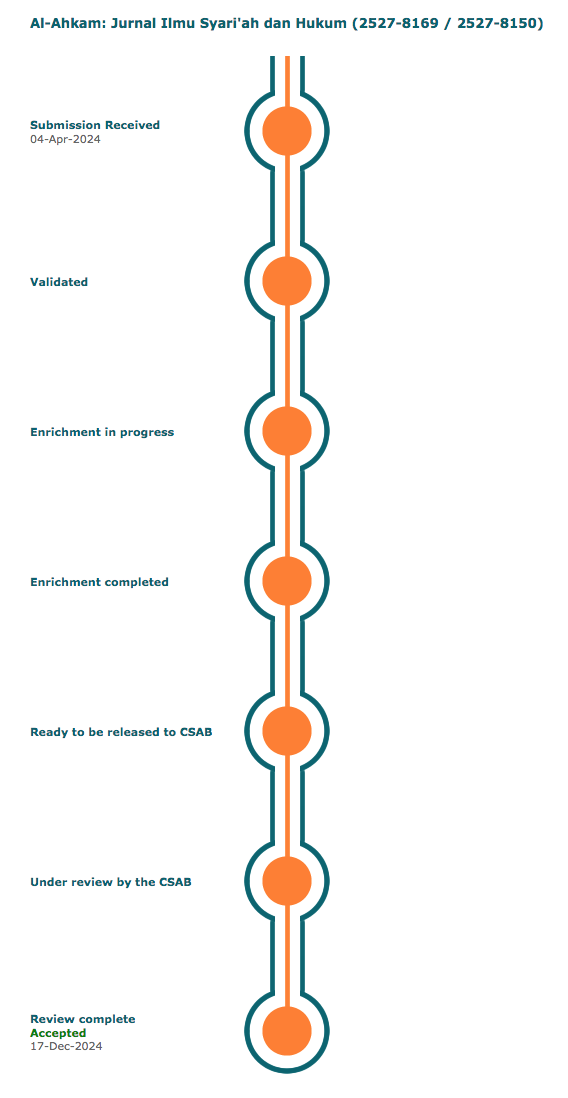Examining Justice! The Double Burden of Women in Indonesia from the Perspective of The Compilation of Islamic Law
Downloads
This study investigates the phenomenon of the double burden faced by women in Indonesia through the lens of the Compilation of Islamic Law (Kompilasi Hukum Islam, KHI). The double burden refers to the dual roles that women fulfill, balancing responsibilities within the household and in the public workforce. Utilizing a qualitative approach and document analysis, this research explores how the KHI addresses women’s roles and responsibilities in both spheres. Real-life cases of Indonesian women are examined to assess how interpretations of the KHI impact their experiences. Findings indicate that while the KHI acknowledges women’s participation in multiple facets of life, its implementation is often constrained by patriarchal interpretations that lack gender sensitivity. This has resulted in women bearing disproportionate responsibilities at home and work. The study underscores the need for a more progressive reinterpretation of the KHI to reduce the double burden on women, promoting gender equality and enhancing women’s welfare in Indonesia. These insights are intended to inform strategies for advancing gender equity within the framework of the KHI, contributing to broader social and legal reforms.
Downloads
Allanana, M. (2013). Patriarchy and Gender Inequality in Nigeria : the Way Forward. European Scientific Journal June, 9(17), 115–144.
Aziz, M. (2023). Women’s Double Burden in the Family Between Culture and Discrimination. Potret Pemikiran, 27(2), 227. https://doi.org/10.30984/pp.v27i2.2782
Badan Pengembangan dan Pembinaan. (2016). KBBI Daring.
Baruch, G. K., Biener, L., & Barnett, R. C. (1987). Women and Gender in Research on Work and Family Stress. American Psychologist, 42(2), 130–136. https://doi.org/10.1037/0003-066X.42.2.130
Beneria, L., & Sen, G. (1982). Class and Gender Inequali ’ Iies and Women ’ S Role in Economic Development Theoretical and Practical Implications. Feminist Studies, 8(1), 157–176.
Biroli, A., & Satriyati, E. (2021). Beban Ganda Perempuan Dalam Mendukung Perekonomian Keluarga Di Masa Pandemi Covid-19. Prosiding Seminar Nasional Penanggulangan Kemiskinan, 1(1), 71–80.
BPS. (2024). Percentage of Formal Labor According to Gender (Percent), 2021-2023. Jakarta. Retrieved from https://www.bps.go.id/en/statistics-table/2/MTE3MCMy/persentase-tenaga-kerja-formal-menurut-jenis-kelamin.html
Budiman, I. (2021). The Islamic Perspective on the Improvement of Family Economy in the New Normal. Samarah: Jurnal Hukum Keluarga Dan Hukum Islam, 5(1), 252–275. https://doi.org/10.22373/sjhk.v5i1.8389
Chairina, N. (2021). Istri Pencari Nafkah Utama Dalam Keluarga (Kajian Pasal 34 Ayat 1 Undang-Undang No. 1 Tahun 1974 Tentang Perkawinan). Jurnal Studi Gender Dan Anak, 8(01), 99. https://doi.org/10.32678/jsga.v8i01.5861
Fadil, Marwinata, P., Jannah, S., & Siroj, A. M. (2024). Religious Moderation and Family Resilience in the City of Malang, Indonesia: The Historical Perspectives of the Islamic Law Fadil. Samarah: Jurnal Hukum Keluarga Dan Hukum Islam, 8(1), 236–256. https://doi.org/10.22373/sjhk.v8i1.19821
Firdaus, Mursal, Desminar, & Halim, S. (2024). The Principles of the Concept of Maslahah in Islamic Family Law of a Wife Looking for Living Husband Taking Care of Household Work. Al-Istinbath: Jurnal Hukum Islam Jurnal Hukum Islam, 9(1), 259–284. https://doi.org/https://dx.doi.org/10.29240/jhi.v9i1.8464 Received:
Hammersley, M. (2013). What is Qualitative Research? New York: Bloomsbury.
Haneef, S. S. S. (2011). Women and Malaysian Islamic family law: Towards a women-affirming jurisprudential reform. Journal of Social Welfare and Family Law, 33(1), 47–60. https://doi.org/10.1080/09649069.2011.571470
Hermanto, A. (2020). Criticism of Feminist Thought on the Rights and Obligations of Husband and Wife from the Perspective of Islamic Family Law. Journal of Islamic Law, 1(2), 182–199. https://doi.org/10.24260/jil.v1i2.61
Hidayah, O., Musyafangah, & Meidina, A. (2023). Analysis of the Rights and Obligations of Husband and Wife in the Compilation of Islamic Law: A Review from the Perspective of Gender Equality. Legitima : Jurnal Hukum Keluarga Islam, 6(2).
Hidayati, N. (2015). Beban Ganda Perempuan Bekerja (Antara Domestik dan Publik). Muwazah, 7(2), 108–119. https://doi.org/10.28918/muwazah.v7i2.516
Ibrahim, B. (2011). The child’s right to maintenance: The extent of the family’s responsibilities in islamic law and according to the family law provisions of muslim countries. Arab Law Quarterly, 25(4), 401–422. https://doi.org/10.1163/157302511X593512
Kumo, A. (2018). Family mismanagement and its repercussions on the society: Islamic law approach to efface the menace. Islamic Quarterly.
Nurani, S. M. (2021). Relasi Hak Dan Kewajiban Suami Istri Dalam Perspektif Hukum Islam (Studi Analitis Relevansi Hak Dan Kewajiban Suami Istri Berdasarkan Tafsir Ahkam Dan Hadits Ahkam). Al-Syakhsiyyah: Journal of Law & Family Studies, 3(1), 98–116. https://doi.org/10.21154/syakhsiyyah.v3i1.2719
Qadri, B. (2023). Islamic Renewal in the Field of Family Law: A Historical Analysis of Gender Equality. El-Usrah, 6(2), 444–455. https://doi.org/10.22373/ujhk.v6i2.17128
Rahmawati, S. (2020). Mainstreaming of gender equality in Islamic family law: Opportunities and challenges. Samarah. https://doi.org/10.22373/sjhk.v4i2.8110
Rokhmad, A., & Susilo, S. (2017). Conceptualizing Authority of the Legalization of Indonesian Women;s Rights in Islamic Family Law. Journal of Indonesian Islam, 11(02), 489–508. https://doi.org/10.15642/JIIS.2017.11.2.489-508
Solikin, N. (2023). The Construction of Family Law in The Compilation of Islamic Law in Indonesia: a Review of John Rawls’s Concept of Justice and Jasser Auda’s Maqashid al-Shari’a. Ulumuna, 27(1), 315–340. https://doi.org/10.20414/ujis.v27i1.708
Stockman, N., Bonney, N., & Sheng, X. (2016). Women’s Work in East and West: The Dual Burden of Employment and Family Life: The Dual Burden of Employment and Family Life. Routledge.
Utsany, R. (2022). Women’s Rights and Gender Equality: An Analysis of Jasser Auda’s Thoughts and His Contribution to Renewal of Islamic Family Law in Indonesia. Journal of Islamic Law, 3(1), 54–73. https://doi.org/10.24260/jil.v3i1.530
UUD 1945 & Amandemen. (2020). Jakarta: Pustaka Sandro Jaya.
Zakaria, S. (2020). Nafkah dan Ketimpangan Gender (Analisis Nafkah dalam Kompilasi Hukum Islam). Ijtihad, 36(2), 51–66.
Zayyadi, A. (2023). Understanding of Legal Reform on Sociology of Islamic Law: Its Relevance to Islamic Family Law in Indonesia. Al-Manahij: Jurnal Kajian Hukum Islam, 17(2), 249–262. https://doi.org/10.24090/mnh.v17i2.7584
Copyright (c) 2024 Qonita Qothrunnada, Asy Syifak Qolbi Maghfur, Lina Kushidayati

This work is licensed under a Creative Commons Attribution-ShareAlike 4.0 International License.








